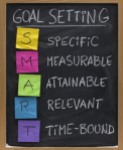G
Get your Goals
So where to start? At the beginning, and keep going until you get what you are aiming for. Simple isn’t it? Well, in theory, yes, simple. In practice, for a lot of people, it is anything but simple, it is in fact one of the most difficult things to do and for a wide variety of reasons too. Some people genuinely don’t have a clue as to what they actually want, they

can tell you quite readily what they don’t want, but not what they do want. Yet when asked to reverse what they don’t want what is offered is still not what they want. So how do you decide what you truly want? It’s best to break it down into different sections in your life:
Sometimes we have conflicting goals so getting what we want is just not going to happen, we’ll get so far on one goal and realise that we’ve not made progress on any of the other ones and abandon the first one, put our attention on the second and repeat the process all over again and oftentimes undoing the progress made in the first goal. Or maybe we are trying to achieve a lot of goals and are spreading ourselves out too thin and it feels too overwhelming after a while, so we give up, disheartened and disillusioned.
Choose one and stick with that. You will often find that when you start to make real progress in one area of your life theother areas start to follow suit. Why does that happen? Because we have chosen a path that is congruent with our

life, that means it’s good for you personally, it’s good for your family, it’s good for your neighbourhood and it’s good for the world. When one of these isn’t good then there will be a conflict of interest somewhere along the goal to block it’s progress. For example: John has been doing all he can in work to get the promotion he wants. He’s dotted all the i’s crossed all the t’s and has had an outstanding interview and has just been offered the much desired promotion…….And it starts in a month’s time!……..but the location has suddenly been changed to Hong Kong! That is not what John wanted, he wanted the promotion in the location he currently works at. Now he really, really wants this promotion. So…does he take it? Well before deciding he’s got to ask himself a few questions first, like: “is it good for me? Yes!!!“, “Is it good for my family? Well I reckon it would be, but I don’t think Mary (wife) is going to want to give up her managerial position in XYZ Company and the kids are doing great in the local school…..“. Before even getting to the third question there is incongruency because John has a fair idea that his wife probably won’t give up her job and up-root the family and re-locate half-way round the world for his promotion, so

John’s goal is not realistic. He needs to clarify his goal – get a promotion, where he is located now.
When you are setting your goals write them down. Only 3% of the world’s population write down their goals and only 1% act in a congruent manner to get them. Make a list of everything you want to achieve, no matter how obscure or unattainable it seems. Write it in the present tense and be very specific, for example it is 27th October 2010 and I am driving out of the dealership with my brand new ’10 black soft-top BMW 5-series with cream leather interior, 16″ alloy wheels, sat-nav, iPod shuffle, phone answering controls on the steering wheel and fully paid for. Repeat this process for all your goals. When you’ve done that, number them in order of importance (do this step really quickly, don’t spend any more than two minutes on this part) and re-write the top ten on the list on to a separate page. It helps to have a lot of blank pages as there at every section there are more questions to answer and writing them down quickly stops you thinking too much about them, that way you put your first answer down. Then ask yourself the following set of questions for each goal on that list:
- Is it for me?
- Am I doing this because it’s what someone else wants for me and I want to please them?
- Where, when, how and with whom do I want it?
- What do I have now and what do I need to get my goal?
- Have I had or done this before?
- Do I know anyone who has?
- For what purpose do I want it?
- Can I act as if I have it?
- What will I gain or lose if I have it?
- What will happen if I get it?
- What won’t happen if I get it?
- What will happen if I don’t get it?
- What won’t happen if I don’t get it?

•
Now to really clarify if the goals written down are what you really want ask yourself the following set of questions:
- How will I know I’ve got it, what will I see, hear and feel, how will I look, speak and stand?
- What would I want if I didn’t have to be unhappy about not getting it?
- What would I want if I knew I couldn’t fail?
- What would I want if I knew it was OK to fail?
- What would I want if I was guaranteed to get it?
You might find that the order of these goals change and if it does, re-write them by order of importance. Now pick the first one and repeat the process again, only this time take note of the steps you need to take to get your goals. For some it might mean returning to education to upskill, for others it might mean changing current behaviours that are just not working for them. Whatever it is it will be blaringly obvious to you, and from that point on you start to take action. And keep taking action. Just note that every time we set a goal into our future, obstacles will continually pop up. These are simply tests to see if we are serious about reaching that goal. Simply go around them as they crop up, you might learn something from the diversion that will help you, and just get back on the path further on.